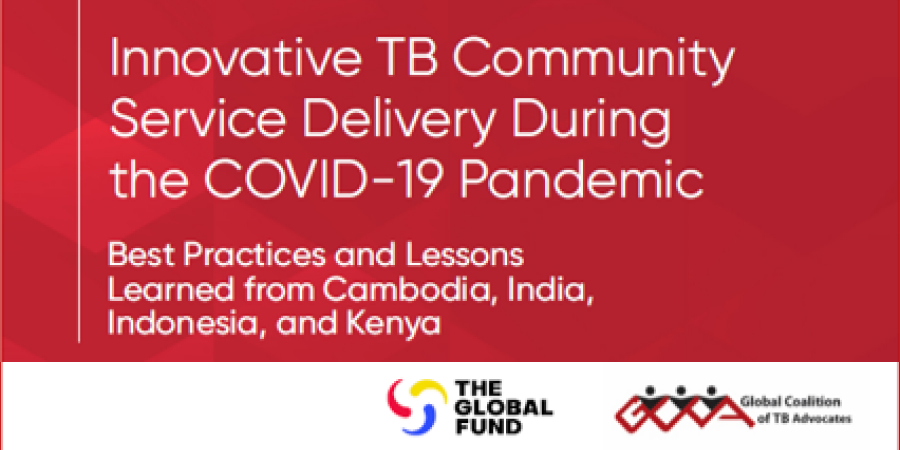LAUNCHED: INNOVATIVE TB COMMUNITY SERVICE DELIVERY DURING THE COVID-19 PANDEMIC: BEST PRACTICES AND LESSONS LEARNED FROM CAMBODIA, INDIA, INDONESIA, AND KENYA REPORT
TB Deaths and Disease Continue to Increase

Innovative TB Community Service Delivery during the COVID-19 Pandemic: Best Practices and Lessons Learned from Cambodia, India, Indonesia, and Kenya Report was launched today at the Community Systems and Responses for the Fight Against Tuberculosis in West and Central Africa Workshop.
This report is the result of the documentation done in collaboration with partners in these 4 countries by the Global Coalition of TB Advocates (GCTA) and supported by The Global Fund TB Strategic Initiative ‘Innovative Approaches to Finding Missing People with TB’ 2021-2023.
Globally, over the past decade and in alignment with UNHLM targets, TB programs have demonstrated an increase in TB case notifications. The onset of the COVID-19 pandemic in early 2020 had a tremendous impact on TB programs and, in some cases, reversed gains made over the past period. Despite the challenges imposed by COVID- 19, countries have taken bold efforts to address the crisis, adapt their programs to an uncertain environment, and recover lost ground. As a result, a number of innovative approaches have been adopted to find and treat missing people with TB. This report is an effort to document the lessons learned from the implementation of these innovative approaches and to share good practices widely across all countries.
Daisy Lekharu, Disease Advisor TB, Global Fund
(Excerpt from the Foreword)
Even though there is substantial input and added value of people affected by TB and other community workers into the TB response, which was especially highlighted during the COVID-19 pandemic, it is very rare that these efforts are documented, recognized and valued. It is important that we actually look at the support that was provided in finding people during the pandemic, during the unprecedented lockdowns and disruption of services, to see how the TB affected communities mobilized themselves to go the extra mile and ensure that people with TB symptoms are found, diagnosed and put on treatment. We are grateful to the global fund, for the support to document this, and we are extremely honored to be launching this report today at the Community Systems and Responses for the Fight Against Tuberculosis in West and Central Africa Workshop. We hope that through this report, the value of communities and community workers will be recognized and valued as partners in the global TB response and will translate to the national and sub-national levels.
(The role of CHWs) is so significant that if you pull them out, you will have the increased number of persons lost to follow-up not only for TB, but for every condition that requires some form of follow-up.
The emergence of the global COVID-19 pandemic in 2020 overwhelmed health systems and resulted in an unprecedented shift of public health resources away from tackling other disease areas to COVID-19 response. Despite the monumental impact of the work of CHWs and the crucial role they play in detecting missing people with TB (PwT), supporting medication adherence, and providing psychosocial support to improve TB outcomes, at the inception of this project, there was no illustrative overview of how innovative community service delivery models sustained TB responses during the COVID-19 pandemic. Through peer-to-peer dialogue; in-depth interviews with CHWs working on TB (including TB champions), 5 National TB Program Coordinators, and technical partners; and focus group discussions in four countries community service delivery mechanisms implemented during the COVID-19 pandemic were documented, along with human rights, gender-related, and other barriers. Key insights and recommendations for reversing COVID-19 related effects on TB mortality, morbidity, and on the livelihoods of TB communities were then compiled for this report.
Read the full report here
Read More